外研版(2019)选择性必修 第四册 Unit 2 Lessons in life Developing ideas Reading课件(共30张)
文档属性
| 名称 | 外研版(2019)选择性必修 第四册 Unit 2 Lessons in life Developing ideas Reading课件(共30张) | 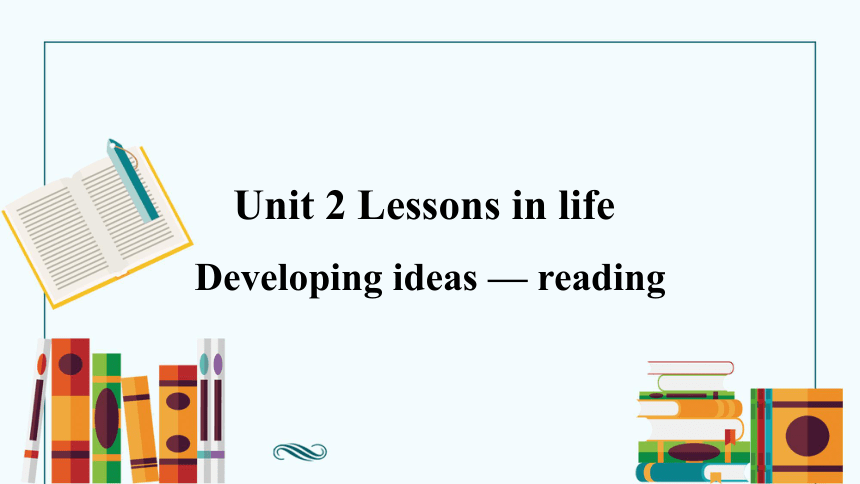 | |
| 格式 | pptx | ||
| 文件大小 | 728.3KB | ||
| 资源类型 | 教案 | ||
| 版本资源 | 外研版(2019) | ||
| 科目 | 英语 | ||
| 更新时间 | 2025-05-02 20:11:17 | ||
图片预览

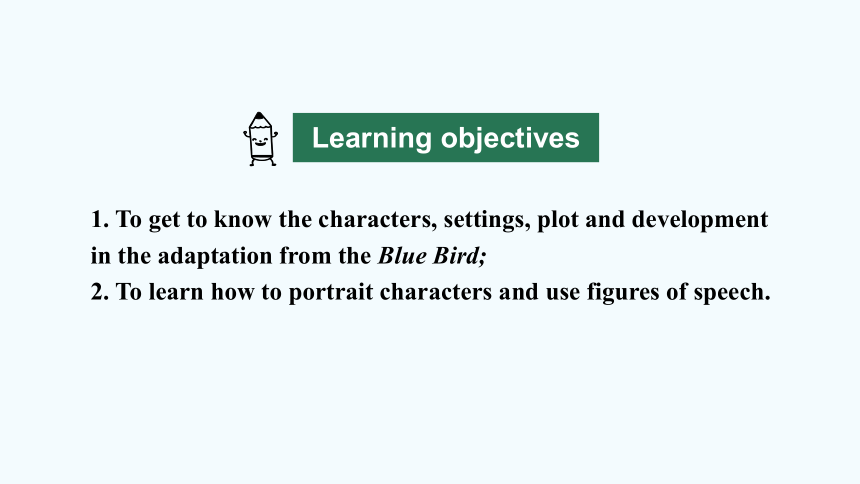
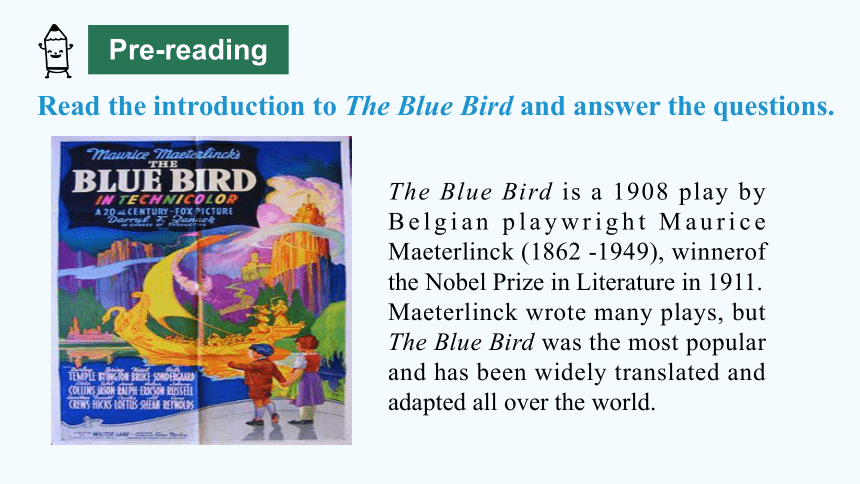
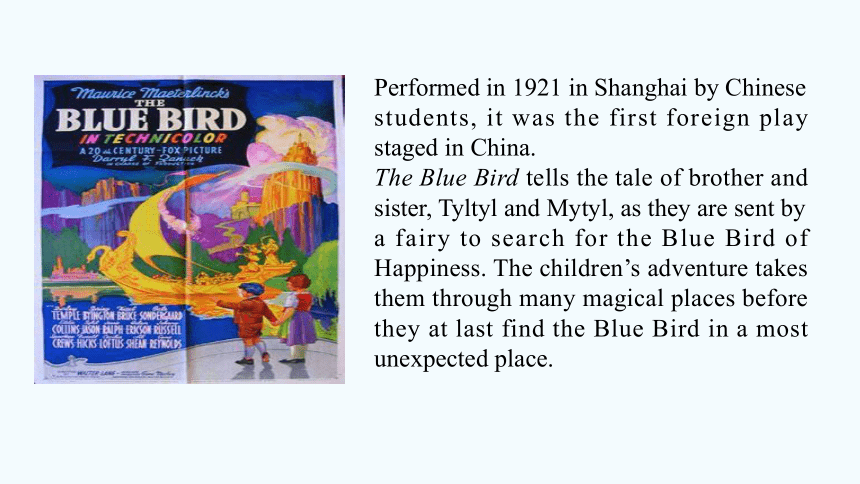
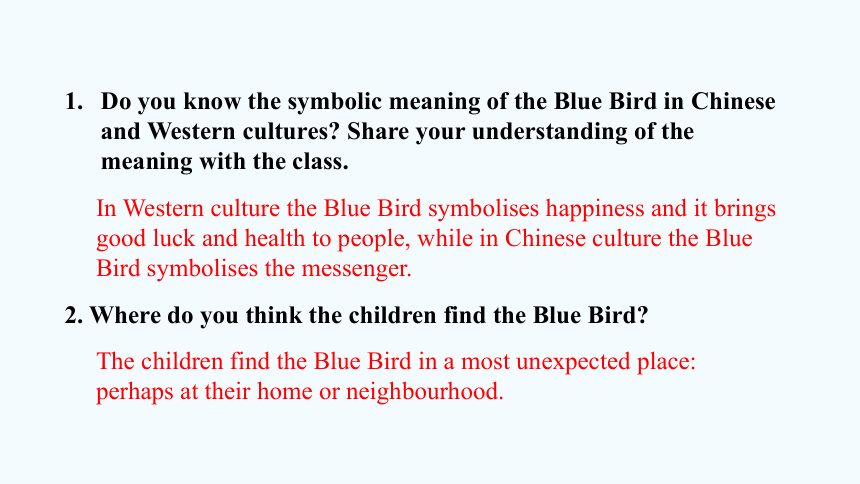
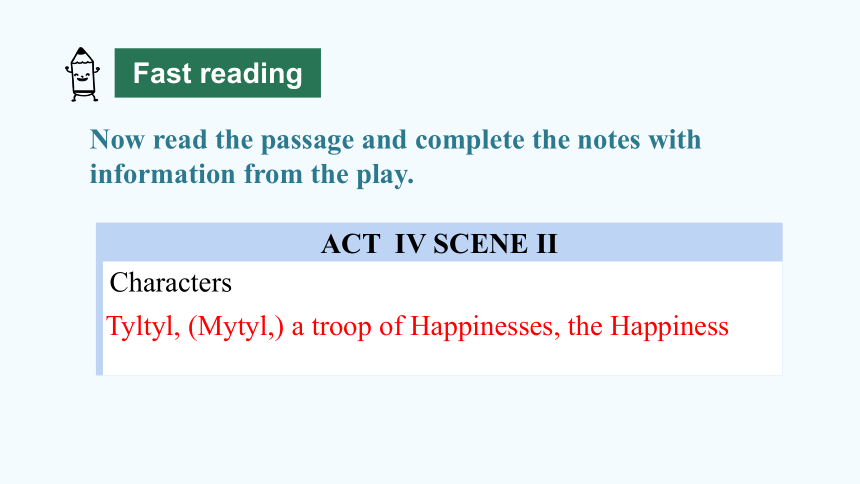
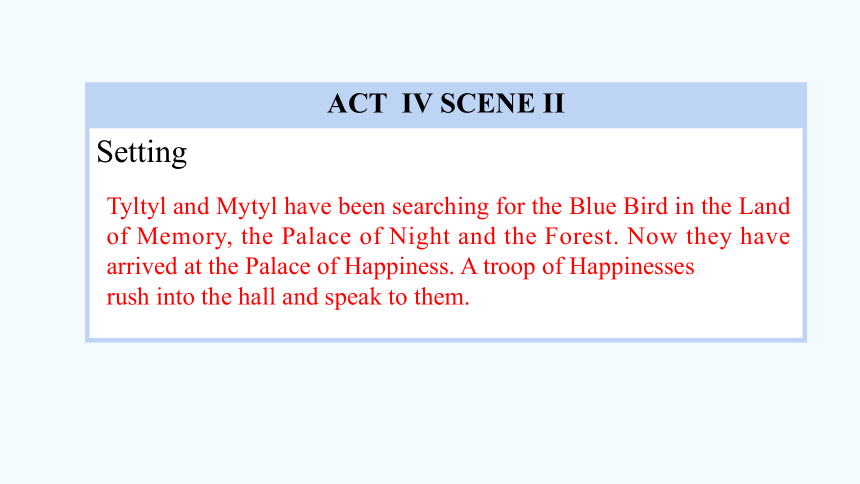
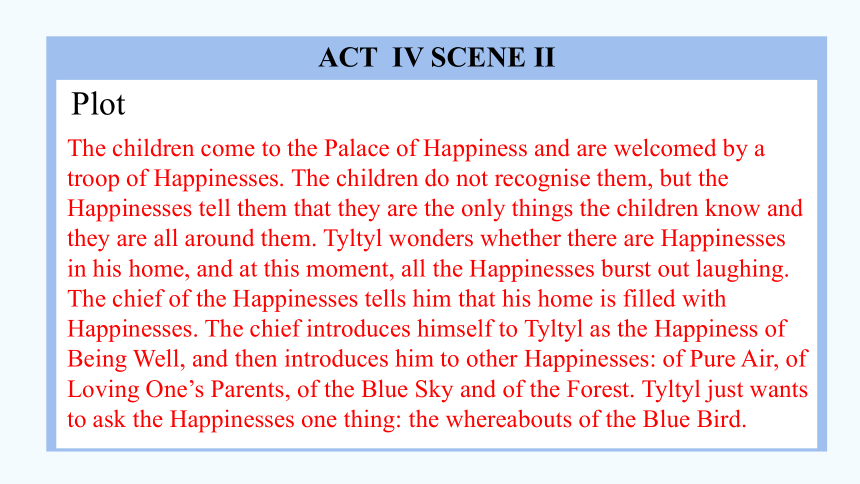
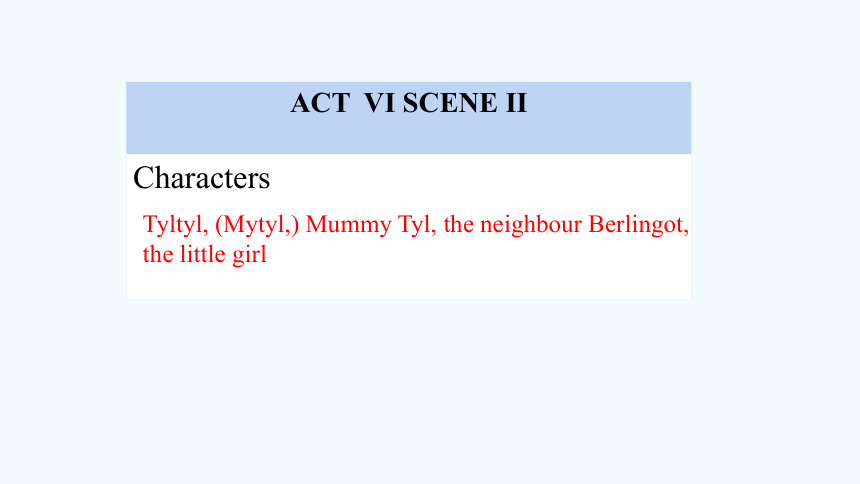
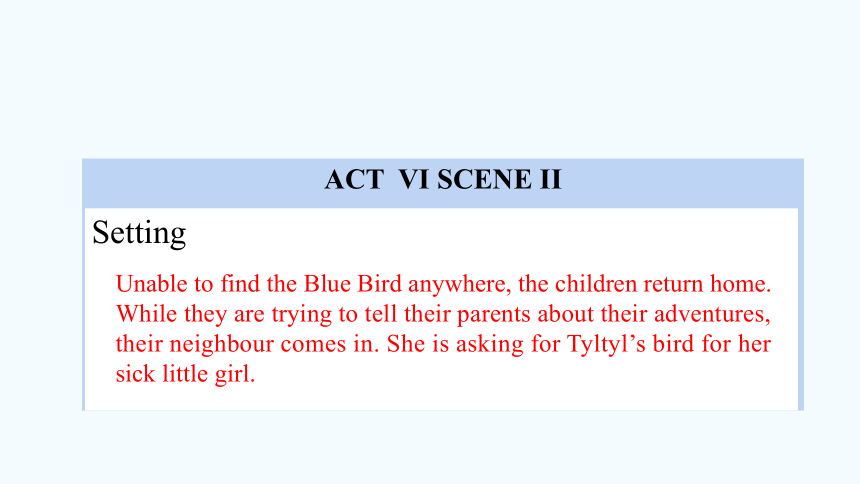
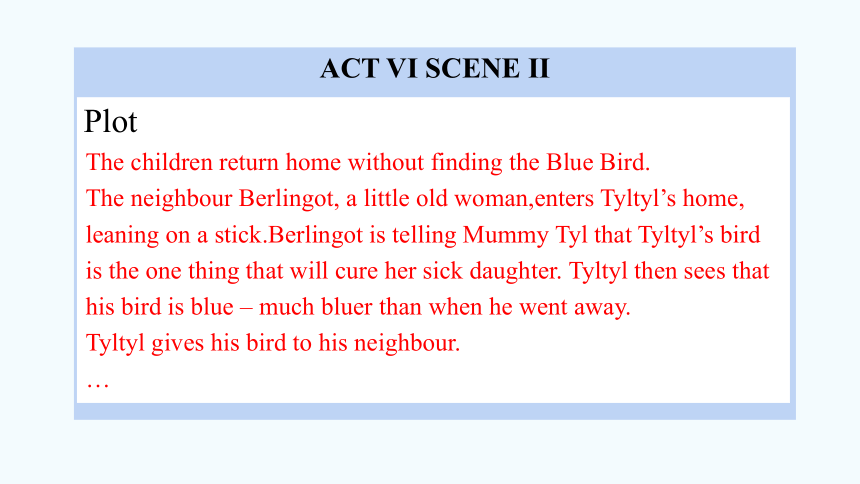
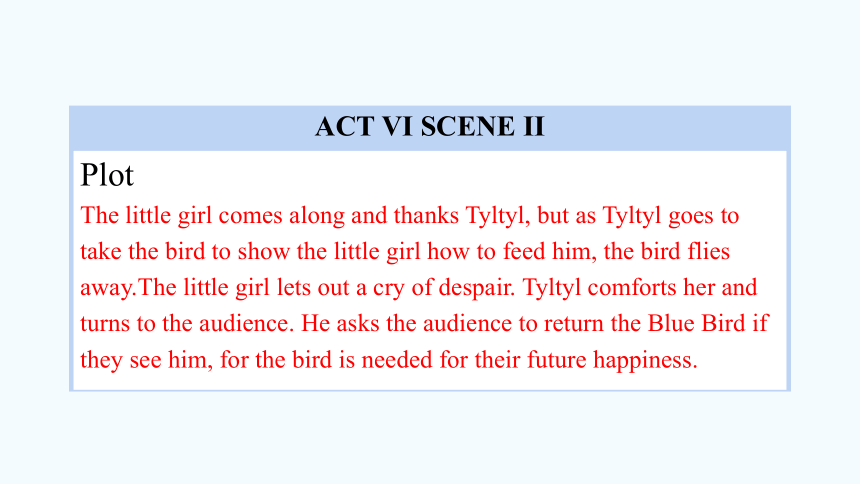
文档简介
(共30张PPT)
Developing ideas — reading
Unit 2 Lessons in life
Learning objectives
1. To get to know the characters, settings, plot and development in the adaptation from the Blue Bird;
2. To learn how to portrait characters and use figures of speech.
Read the introduction to The Blue Bird and answer the questions.
The Blue Bird is a 1908 play by Belgian playwright Maurice Maeterlinck (1862 -1949), winnerof the Nobel Prize in Literature in 1911. Maeterlinck wrote many plays, but The Blue Bird was the most popular and has been widely translated and adapted all over the world.
Pre-reading
Performed in 1921 in Shanghai by Chinese students, it was the first foreign play staged in China.
The Blue Bird tells the tale of brother and sister, Tyltyl and Mytyl, as they are sent by a fairy to search for the Blue Bird of Happiness. The children’s adventure takes them through many magical places before they at last find the Blue Bird in a most unexpected place.
Do you know the symbolic meaning of the Blue Bird in Chinese and Western cultures Share your understanding of the meaning with the class.
In Western culture the Blue Bird symbolises happiness and it brings good luck and health to people, while in Chinese culture the Blue Bird symbolises the messenger.
2. Where do you think the children find the Blue Bird
The children find the Blue Bird in a most unexpected place: perhaps at their home or neighbourhood.
ACT IV SCENE II
Characters
Tyltyl, (Mytyl,) a troop of Happinesses, the Happiness
Now read the passage and complete the notes with information from the play.
Fast reading
ACT IV SCENE II
Setting
Tyltyl and Mytyl have been searching for the Blue Bird in the Land of Memory, the Palace of Night and the Forest. Now they have arrived at the Palace of Happiness. A troop of Happinesses
rush into the hall and speak to them.
ACT IV SCENE II
Plot
The children come to the Palace of Happiness and are welcomed by a troop of Happinesses. The children do not recognise them, but the Happinesses tell them that they are the only things the children know and they are all around them. Tyltyl wonders whether there are Happinesses in his home, and at this moment, all the Happinesses burst out laughing. The chief of the Happinesses tells him that his home is filled with Happinesses. The chief introduces himself to Tyltyl as the Happiness of Being Well, and then introduces him to other Happinesses: of Pure Air, of Loving One’s Parents, of the Blue Sky and of the Forest. Tyltyl just wants to ask the Happinesses one thing: the whereabouts of the Blue Bird.
ACT VI SCENE II
Characters
Tyltyl, (Mytyl,) Mummy Tyl, the neighbour Berlingot, the little girl
ACT VI SCENE II
Setting
Unable to find the Blue Bird anywhere, the children return home. While they are trying to tell their parents about their adventures, their neighbour comes in. She is asking for Tyltyl’s bird for her sick little girl.
ACT VI SCENE II
Plot
The children return home without finding the Blue Bird.
The neighbour Berlingot, a little old woman,enters Tyltyl’s home, leaning on a stick.Berlingot is telling Mummy Tyl that Tyltyl’s bird
is the one thing that will cure her sick daughter. Tyltyl then sees that his bird is blue – much bluer than when he went away.
Tyltyl gives his bird to his neighbour.
…
ACT VI SCENE II
Plot
The little girl comes along and thanks Tyltyl, but as Tyltyl goes to take the bird to show the little girl how to feed him, the bird flies away.The little girl lets out a cry of despair. Tyltyl comforts her and turns to the audience. He asks the audience to return the Blue Bird if they see him, for the bird is needed for their future happiness.
Now work in groups and talk about how much you like the play. Give your reasons.
Learning to learn
The Blue Bird is a typical full-length play, which means it has several acts and each act is composed of several scenes. The whole play depicts actions that take place over a long period of time. Various characters appear in different acts and scenes, and the settings and costumes change accordingly. The running time of a full-length play can last for several hours, even days.
Intensive reading
1. Why cannot Tyltyl recognise any of the Happinesses
2. Are there any Happinesses in your home What are they Where else can you find them
3. What does the author want to express by making the Blue Bird fly away at the end of the play
4. What different life lessons can you learn from the two reading passages in this unit
Think & Share
1. Why cannot Tyltyl recognise any of the Happinesses
Because he doesn’t realise the fact that the Happinesses are all around him in his home.
2. Are there any Happinesses in your home What are they Where else can you find them
Share your opinions with the class.
3. What does the author want to express by making the Blue Bird fly away at the end of the play
One possible version:
By making the Blue Bird fly away at the end of the play, the author wants to tell us great happiness is not based on material things, but a more meaningful, spiritual joy and that giving and sharing sometimes mean the true happiness.
4. What different life lessons can you learn from the two reading passages in this unit
From the first reading passage Tuesdays with Morrie, I have learnt that we should appreciate what we have and make the most of each day; it’s up to us to find out what is important in our lives and establish our own dreams; love each other as much as we could.
From the second reading passage the Blue Bird I’ve got that great happiness is not based on material things, but a more meaningful, spiritual joy.
Work in groups and act out the play.
1 Read the play again and discuss how you might present it on stage. Consider the following:
Plot–Is there anything you will cut from, or add to the play
Setting–What costumes and props will you need
Roles–Will you need a narrator to give the background to the play and introduce the new scenes
Language–Will you revise the language to make it easier to remember
Post-reading
Now talk about how well your group performed. Vote for the best performer in the play.
2 Adapt the play based on your discussion. You may refer to the original play for more ideas if necessary.
3 Decide roles for each group member and practise performing the play.
4 Act out the play in class.
1. outstretched adj. 伸展的;张开的
He ran towards her with arms outstretched / with outstretched arms. 他张开双臂朝她飞奔而去。
同源词:
stretch v. 拉长;拽宽;撑大
stretchable adj. 能伸展的;可伸缩的
Language points
2. transparent adj.
1) 透明的;清澈的
The insect’s wings are almost transparent.
这昆虫的翅膀几乎是透明的。
a man of transparent honesty 显然很诚实的人
派生词
transparently adv. transparently obvious 显而易见
2)易识破的;易看穿的;显而易见的
3. stroke v. & n.
1) v. 轻抚,抚摩
He’s a beautiful dog. Can I stroke him
这条狗真漂亮。我可以摸一摸吗?
He stroked her hair affectionately.
他深情地抚摩着她的头发。
to have / suffer a stroke 患中风
His punishment was six strokes of the cane.
给他的惩罚是挨六教鞭。
2) n. 击球(动作);(打、击等的)一下,一击;中风
1. search for ______________
2. a troop of ______________
3. burst our laughing ______________
4. be crammed with ______________
5. be dressed in ______________
6. bursts of laughter _________________
7. the majority of … _________________
9. be reluctant to do sth. _________________
10. lean on _________________
11. so … as to … _________________
寻找
一群
突然大笑起来
塞满,填满
穿着……
哈哈大笑声
大多数……
靠在……上
不情愿做某事……
如此……以至于
1. They dance merrily around the CHILDREN, then the one who appears to be the chief goes up to TYLTYL with hand outstretched.
Paraphrase: They dance around the CHILDREN happily, then the one who seems to be the chief comes up to TYLTYL and stretches hand.
本句中 with hand outstretched 表伴随。with 后面的名词或名词短语可以接形容词、副词、现在分词或不定式等。例如:
The girl is accustomed to sleeping with the window open. 这个女孩习惯开着窗户睡觉。
I can’t do my homework with all this noise going on.
这么吵,我没法做家庭作业。
2. Why, no ... I don’t remember seeing any of you
文中多次出现 why 这个词,在这里 why 并不意为常见的“为什么”,而是表示惊讶或突然意识到某事,意思是“哎呀,嘿”。例如:
Why, look who’s here!
哎呀,看看这是谁!
3. TYLTYL Then there are Happinesses in my home
THE HAPPINESS You heard him! Are there Happinesses in his home! Why, it is crammed with Happinesses!
以上对白中You heard him! 使用过去时是非常贴切、应景的。作者连用三个感叹句来表达一种强烈的感情,寓意深刻。另外以上对白中出现了陈述句式的疑问句和疑问句式的感叹句,这些在文学作品中,尤其是戏剧中比较常见。本课的戏剧剧本中,还出现了很多其他的感叹句。例如:
Why, we are the only things you do know! We are always around you! We eat, drink, wake up, breathe and live with you!
My bird! Why, he’s blue! But it’s my turtle-dove! But he’s much bluer than when I went away! Why, that’s the Blue Bird we were looking for!
She can run, she can dance, she can fly!
(with a cry of despair) He is gone!
4. If any of you should find him, would you be so very kind as to give him back to us
Paraphrase: If it might be possible for any of you to find him, would you be so kind enough as to return him to us
本句中的 should 是正式和礼貌的用法,尤其用在英式英语中。这里的 should 意为“可能”,用于表示某事可能会发生或属实。例如:
What if I should fall sick and not be able to work
万一我生病无法工作的话怎么办?
Write a short passage about what you have learnt from the play with 100 words.
Homework
Developing ideas — reading
Unit 2 Lessons in life
Learning objectives
1. To get to know the characters, settings, plot and development in the adaptation from the Blue Bird;
2. To learn how to portrait characters and use figures of speech.
Read the introduction to The Blue Bird and answer the questions.
The Blue Bird is a 1908 play by Belgian playwright Maurice Maeterlinck (1862 -1949), winnerof the Nobel Prize in Literature in 1911. Maeterlinck wrote many plays, but The Blue Bird was the most popular and has been widely translated and adapted all over the world.
Pre-reading
Performed in 1921 in Shanghai by Chinese students, it was the first foreign play staged in China.
The Blue Bird tells the tale of brother and sister, Tyltyl and Mytyl, as they are sent by a fairy to search for the Blue Bird of Happiness. The children’s adventure takes them through many magical places before they at last find the Blue Bird in a most unexpected place.
Do you know the symbolic meaning of the Blue Bird in Chinese and Western cultures Share your understanding of the meaning with the class.
In Western culture the Blue Bird symbolises happiness and it brings good luck and health to people, while in Chinese culture the Blue Bird symbolises the messenger.
2. Where do you think the children find the Blue Bird
The children find the Blue Bird in a most unexpected place: perhaps at their home or neighbourhood.
ACT IV SCENE II
Characters
Tyltyl, (Mytyl,) a troop of Happinesses, the Happiness
Now read the passage and complete the notes with information from the play.
Fast reading
ACT IV SCENE II
Setting
Tyltyl and Mytyl have been searching for the Blue Bird in the Land of Memory, the Palace of Night and the Forest. Now they have arrived at the Palace of Happiness. A troop of Happinesses
rush into the hall and speak to them.
ACT IV SCENE II
Plot
The children come to the Palace of Happiness and are welcomed by a troop of Happinesses. The children do not recognise them, but the Happinesses tell them that they are the only things the children know and they are all around them. Tyltyl wonders whether there are Happinesses in his home, and at this moment, all the Happinesses burst out laughing. The chief of the Happinesses tells him that his home is filled with Happinesses. The chief introduces himself to Tyltyl as the Happiness of Being Well, and then introduces him to other Happinesses: of Pure Air, of Loving One’s Parents, of the Blue Sky and of the Forest. Tyltyl just wants to ask the Happinesses one thing: the whereabouts of the Blue Bird.
ACT VI SCENE II
Characters
Tyltyl, (Mytyl,) Mummy Tyl, the neighbour Berlingot, the little girl
ACT VI SCENE II
Setting
Unable to find the Blue Bird anywhere, the children return home. While they are trying to tell their parents about their adventures, their neighbour comes in. She is asking for Tyltyl’s bird for her sick little girl.
ACT VI SCENE II
Plot
The children return home without finding the Blue Bird.
The neighbour Berlingot, a little old woman,enters Tyltyl’s home, leaning on a stick.Berlingot is telling Mummy Tyl that Tyltyl’s bird
is the one thing that will cure her sick daughter. Tyltyl then sees that his bird is blue – much bluer than when he went away.
Tyltyl gives his bird to his neighbour.
…
ACT VI SCENE II
Plot
The little girl comes along and thanks Tyltyl, but as Tyltyl goes to take the bird to show the little girl how to feed him, the bird flies away.The little girl lets out a cry of despair. Tyltyl comforts her and turns to the audience. He asks the audience to return the Blue Bird if they see him, for the bird is needed for their future happiness.
Now work in groups and talk about how much you like the play. Give your reasons.
Learning to learn
The Blue Bird is a typical full-length play, which means it has several acts and each act is composed of several scenes. The whole play depicts actions that take place over a long period of time. Various characters appear in different acts and scenes, and the settings and costumes change accordingly. The running time of a full-length play can last for several hours, even days.
Intensive reading
1. Why cannot Tyltyl recognise any of the Happinesses
2. Are there any Happinesses in your home What are they Where else can you find them
3. What does the author want to express by making the Blue Bird fly away at the end of the play
4. What different life lessons can you learn from the two reading passages in this unit
Think & Share
1. Why cannot Tyltyl recognise any of the Happinesses
Because he doesn’t realise the fact that the Happinesses are all around him in his home.
2. Are there any Happinesses in your home What are they Where else can you find them
Share your opinions with the class.
3. What does the author want to express by making the Blue Bird fly away at the end of the play
One possible version:
By making the Blue Bird fly away at the end of the play, the author wants to tell us great happiness is not based on material things, but a more meaningful, spiritual joy and that giving and sharing sometimes mean the true happiness.
4. What different life lessons can you learn from the two reading passages in this unit
From the first reading passage Tuesdays with Morrie, I have learnt that we should appreciate what we have and make the most of each day; it’s up to us to find out what is important in our lives and establish our own dreams; love each other as much as we could.
From the second reading passage the Blue Bird I’ve got that great happiness is not based on material things, but a more meaningful, spiritual joy.
Work in groups and act out the play.
1 Read the play again and discuss how you might present it on stage. Consider the following:
Plot–Is there anything you will cut from, or add to the play
Setting–What costumes and props will you need
Roles–Will you need a narrator to give the background to the play and introduce the new scenes
Language–Will you revise the language to make it easier to remember
Post-reading
Now talk about how well your group performed. Vote for the best performer in the play.
2 Adapt the play based on your discussion. You may refer to the original play for more ideas if necessary.
3 Decide roles for each group member and practise performing the play.
4 Act out the play in class.
1. outstretched adj. 伸展的;张开的
He ran towards her with arms outstretched / with outstretched arms. 他张开双臂朝她飞奔而去。
同源词:
stretch v. 拉长;拽宽;撑大
stretchable adj. 能伸展的;可伸缩的
Language points
2. transparent adj.
1) 透明的;清澈的
The insect’s wings are almost transparent.
这昆虫的翅膀几乎是透明的。
a man of transparent honesty 显然很诚实的人
派生词
transparently adv. transparently obvious 显而易见
2)易识破的;易看穿的;显而易见的
3. stroke v. & n.
1) v. 轻抚,抚摩
He’s a beautiful dog. Can I stroke him
这条狗真漂亮。我可以摸一摸吗?
He stroked her hair affectionately.
他深情地抚摩着她的头发。
to have / suffer a stroke 患中风
His punishment was six strokes of the cane.
给他的惩罚是挨六教鞭。
2) n. 击球(动作);(打、击等的)一下,一击;中风
1. search for ______________
2. a troop of ______________
3. burst our laughing ______________
4. be crammed with ______________
5. be dressed in ______________
6. bursts of laughter _________________
7. the majority of … _________________
9. be reluctant to do sth. _________________
10. lean on _________________
11. so … as to … _________________
寻找
一群
突然大笑起来
塞满,填满
穿着……
哈哈大笑声
大多数……
靠在……上
不情愿做某事……
如此……以至于
1. They dance merrily around the CHILDREN, then the one who appears to be the chief goes up to TYLTYL with hand outstretched.
Paraphrase: They dance around the CHILDREN happily, then the one who seems to be the chief comes up to TYLTYL and stretches hand.
本句中 with hand outstretched 表伴随。with 后面的名词或名词短语可以接形容词、副词、现在分词或不定式等。例如:
The girl is accustomed to sleeping with the window open. 这个女孩习惯开着窗户睡觉。
I can’t do my homework with all this noise going on.
这么吵,我没法做家庭作业。
2. Why, no ... I don’t remember seeing any of you
文中多次出现 why 这个词,在这里 why 并不意为常见的“为什么”,而是表示惊讶或突然意识到某事,意思是“哎呀,嘿”。例如:
Why, look who’s here!
哎呀,看看这是谁!
3. TYLTYL Then there are Happinesses in my home
THE HAPPINESS You heard him! Are there Happinesses in his home! Why, it is crammed with Happinesses!
以上对白中You heard him! 使用过去时是非常贴切、应景的。作者连用三个感叹句来表达一种强烈的感情,寓意深刻。另外以上对白中出现了陈述句式的疑问句和疑问句式的感叹句,这些在文学作品中,尤其是戏剧中比较常见。本课的戏剧剧本中,还出现了很多其他的感叹句。例如:
Why, we are the only things you do know! We are always around you! We eat, drink, wake up, breathe and live with you!
My bird! Why, he’s blue! But it’s my turtle-dove! But he’s much bluer than when I went away! Why, that’s the Blue Bird we were looking for!
She can run, she can dance, she can fly!
(with a cry of despair) He is gone!
4. If any of you should find him, would you be so very kind as to give him back to us
Paraphrase: If it might be possible for any of you to find him, would you be so kind enough as to return him to us
本句中的 should 是正式和礼貌的用法,尤其用在英式英语中。这里的 should 意为“可能”,用于表示某事可能会发生或属实。例如:
What if I should fall sick and not be able to work
万一我生病无法工作的话怎么办?
Write a short passage about what you have learnt from the play with 100 words.
Homework
